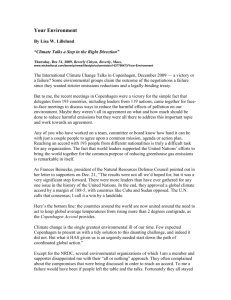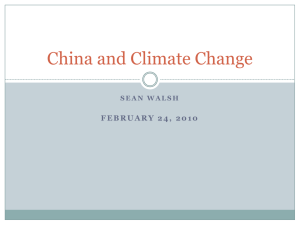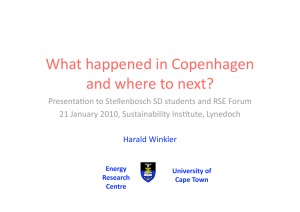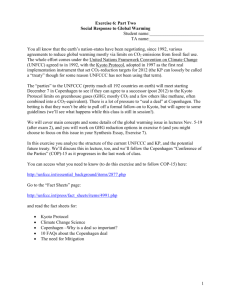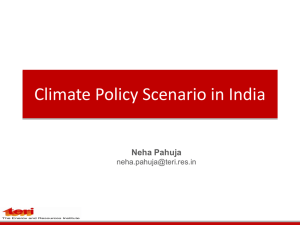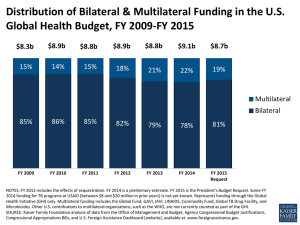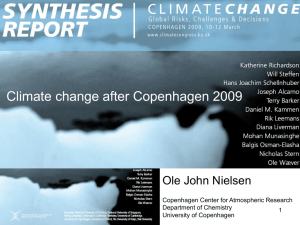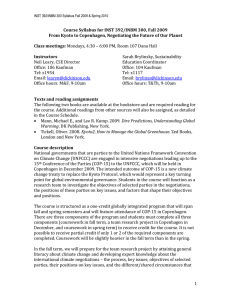Climate Change Negotiations: The Challenge for Indian Diplomacy
advertisement
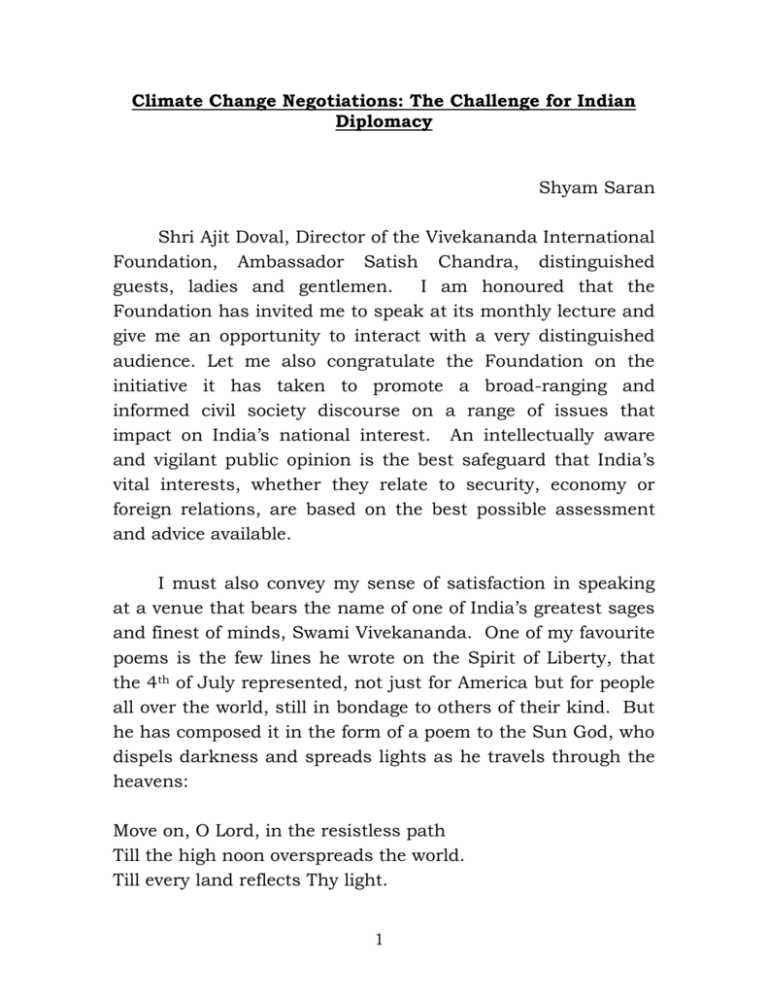
Climate Change Negotiations: The Challenge for Indian Diplomacy Shyam Saran Shri Ajit Doval, Director of the Vivekananda International Foundation, Ambassador Satish Chandra, distinguished guests, ladies and gentlemen. I am honoured that the Foundation has invited me to speak at its monthly lecture and give me an opportunity to interact with a very distinguished audience. Let me also congratulate the Foundation on the initiative it has taken to promote a broad-ranging and informed civil society discourse on a range of issues that impact on India’s national interest. An intellectually aware and vigilant public opinion is the best safeguard that India’s vital interests, whether they relate to security, economy or foreign relations, are based on the best possible assessment and advice available. I must also convey my sense of satisfaction in speaking at a venue that bears the name of one of India’s greatest sages and finest of minds, Swami Vivekananda. One of my favourite poems is the few lines he wrote on the Spirit of Liberty, that the 4th of July represented, not just for America but for people all over the world, still in bondage to others of their kind. But he has composed it in the form of a poem to the Sun God, who dispels darkness and spreads lights as he travels through the heavens: Move on, O Lord, in the resistless path Till the high noon overspreads the world. Till every land reflects Thy light. 1 Till men and women with uplifted head Behold their shackles broken, and Know in springtime joy, their Life renewed. Vivekananda – 1898 But now let’s get down to more earthly matters. During my talk today, I intend to focus on certain key issues relating to the ongoing multilateral negotiations on Climate Change under the UN Framework Convention on Climate Change (UNFCCC) and its Kyoto Protocol. I will not go into a narrative of the negotiations themselves or specific items on the negotiating agenda, since these are readily available. Instead I will try and focus on a broader perspective linking Climate Change diplomacy to the overall national interest. Let me begin by pointing out that Climate Change negotiations, as they have unfolded in the past two years, have become less and less about Climate Change and progressively more about the overall economic and even political interests of the major countries involved. While the rhetoric continues to be that the countries of the world are confronted with a global, cross-cutting challenge which demands a collaborative response, the reality is different. The negotiations so far have been conducted instead, in a competitive spirit, where each country or group of countries seeks to concede as little as possible and extract as much as it can from others. This is so because action on Climate Change entails a change in energy access and energy use by countries. A shift away from growth patterns based on fossil fuel use requires massive resources, both financial and technological. The more rapid the shift, the greater the scale of resources required. The crucial question, therefore, is: Who will pay? 2 Often in our country the debate on Climate Change is based on a faulty perspective. Some people think that India is taking an obstinate or unreasonable stand in the negotiations by insisting that it should not have to take on international, legally binding commitments to reduce its greenhouse gas emissions. The criticism is that limiting or reducing such emissions is in our own interest and that it is countries like India who will be most impacted by Climate Change. It is certainly not my contention that India should not do anything to reduce its emissions or embrace a strategic shift from our current reliance on fossil fuels to a pattern of growth based on renewable sources of energy such as solar and clean sources of energy such as nuclear. Quite the contrary, we must do everything we can, within the limitation of our resources, to accelerate such a shift. I have often pointed out that even if there was no Climate Change, India will still need to undertake this shift for reasons of energy security. In a world of rapidly depleting fossil fuel resources, there is no way this country can maintain a high rate of growth while continuing its dependence on conventional energy, most of which have to be sourced from abroad. And, to be fair, this is what we have been engaged in, whether through the National Action Plan on Climate Change, adopted in June 2008 or through the Civil Nuclear Agreement, which became a reality in September 2008, with the Nuclear Suppliers’ Group re-engaging with India in civil nuclear commerce. The argument at the multilateral negotiations is about something quite different. The issue is about burdensharing relating to a global issue, subject to positive and negative external economies. 3 Let me explain this a little further. India accounts for 4% of the current global GHG emissions. Supposing we were, by some miracle, able to reduce this to zero. Unless other countries, in particular, those responsible for much higher levels of emissions, such as the U.S. and China, with 20% each, were to achieve much more drastic reductions, the threat to India from Climate Change would remain undiminished. Our glaciers would still melt. There would still be more frequent droughts or unseasonal rain. Our islands and low-lying coastal plains, would still get submerged due to sea-level rise. Here is a classic external economy dilemma: what I invest cannot be directly related to the outcome. It is equally possible that I benefit from what others invest in, since I stand to enjoy a global public good being created. Therefore, in dealing with cross-cutting, global issues such as Climate Change, it becomes necessary to align the external economies being generated with a burden-sharing arrangement that makes economic sense to the countries participating in the multilateral regime. It should be quite obvious that for any given outcome, say a 50% cut in global emissions by 2050, over 1990 as the base year, the distribution of the reductions among countries could place the burden more on some, less on others. And this goes to the heart of the negotiations. What is a fair and equitable burden-sharing arrangement? What is the stand taken by India and most developing countries on this issue? Our stand is that the basis for such burden sharing has already been agreed to by consensus in the UN Framework Convention on Climate Change better known as the historic Rio Convention. In that Convention, there is acknowledgement that Climate Change is taking place, not 4 due to current emissions but due to the GHGs accumulated in the earth’s atmosphere since carbon-based industrial actively began over two centuries ago. There is, therefore, a historical responsibility which developed industrialized countries have, to take the lead in reducing their current emissions and in supporting mitigation and adaptation in developing countries with both financial and technological resources. This is the well-accepted principle of “common but differentiated responsibilities and respective capabilities” that recognizes the principle of non-reciprocity and differential treatment of developed and developing countries respectively. What is now under attack in the multilateral negotiations is precisely this principle. The United States, European Union and other developed countries wish to eviscerate, if not abandon the UNFCCC, and push through a new template for global action, where the burden of adjustment will fall mainly on developing countries. Currently, in the UNFCCC, Climate Change action by developing countries is conditional upon enabling support from developed countries. If this conditionality is removed, then the burden of adjustment will have to be borne largely by us. Will this or will this not constrain our growth prospects? We have heard the argument that India has been foolish in working together with China on Climate issues since the latter is in a different league as far as its level of emissions are concerned – 20% of the global total to India’s 4%. It is suggested that we should delink ourselves from China and get a better deal for ourselves. This implies that a better deal is in fact on offer. Actually, it is quite the contrary. In the two years that I have had the privilege of representing India in the Climate negotiations, I found a deliberate and systematic diplomatic offensive to put India on 5 the defensive, characterize it as a nay-sayer and, as the Economist once said, acquire the reputation of being obstinate and recalcitrant. China, on the other hand, despite being a much larger emitter, was regularly praised as being flexible, forward-looking and willing to work together with the likes of the United States. Never mind that in the negotiating room itself, China took positions which were, on occasion, much more hardline than India. For example, while India committed itself to never exceeding the per capita emissions of developed countries at any stage during our growth trajectory, thereby diluting the principle of historical responsibility, China was not prepared to relent on this. This state of affairs remained right up to the Copenhagen Conference. Nothing that China said or did at Copenhagen represented any noteworthy change in its stand on Climate issues and yet it was projected as the villain which stood in the way of a meaningful outcome. Why was this the case? Again, in my view, this had to do less with Climate Change and more with the disappointed expectations of the US and the European Union that China would be forthcoming on Yuan exchange rate adjustment, on sanctioning Iran and on curtailing North Korea’s nuclear ambitions, among others. India stood together with China both before and at Copenhagen precisely because our interests were aligned in terms of the burden-sharing issue I referred to. There was no willingness on the part of the developed countries to differentiate India’s situation from China’s, nor offer either technology or financial resources to enable India to scale up its own ambitious efforts to deal with Climate Change. If we were being in any case tarred with the same brush as China was, does it not make sense for us to work with China? The issue here is not that we are being branded as naysayers. As a negotiator one’s brief is not to win a popularity contest but to safeguard India’s interests. 6 Certainly, we should be flexible, open to compromise and negotiate constructively. But it is also important to appreciate that in branding India as “obdurate” or as a naysayer, there was also psychological pressure being brought upon us. It is, for experienced diplomacy, to uncover and resist such pressure and to educate our own public opinion about this. So what did we manage to achieve at Copenhagen and where do we go from here? Several months before Copenhagen, it was already clear that the multilateral negotiations would not deliver on the mandate agreed to, again by consensus, at Bali in December 2007. The incoming Chairman of the 15th Conference of Parties at Copenhagen, Denmark, already declared that only a “political” agreement would be possible, which would not entail legally binding obligations. While developing countries, including India, continued to press for a substantive outcome, it was obvious that we could bring the horse to the spring, but could not make it drink. After all, it was the developed countries who had to sign on to significant emission reduction targets both for the mid-term and the long term. It is they who had to deliver on commitments to provide finance and technology to enable Climate Change action by developing countries. If they were unable or unwilling to do so, there was little that the developing world could do. Confronted with this reality, our objective became essentially a holding operation, i.e. ensure that the multilateral negotiating process continued post-Copenhagen and without diluting the consensus mandate agreed to in Bali. This was achieved and the only two decisions adopted by COP15 were to re-establish the Ad Hoc Working Group on the Long 7 Term Cooperative Action, or the Bali Action Plan and to continue with the work of the Ad Hoc Working Group on the Kyoto Protocol, under which developed countries must fulfill their legal obligation to assume emission reduction targets for the second commitment period, commencing in 2013. This was a significant achievement in the face of relentless attempts to denigrate the UN process, overturn the UNFCCC by insisting on a new legally binding agreement and to abandon the Kyoto Protocol altogether. This was possible only because of the very close and effective coordination among the BASIC countries (Brazil, South Africa, India and China) and the lead they were able to give in this respect to G-77 and China. So we live to fight another day. What about the Copenhagen Accord? Before we make any judgements about India’s role in the deliberations leading up to the Accord, it is important for us to appreciate the setting and the environment in which this “political” agreement was born. This was the first time in the history of multilateral negotiations that a limited group of Heads of State and Government, participated actively and directly in the drafting of an outcome document. The Western countries came well prepared since Denmark as Chairman, was more than willing to oblige and advance their agenda. It was quite obvious that the Chairman’s text which became the basis of the Accord, had already been the subject of careful and detailed consideration by the Western industrialized countries. Their leaders were familiar with the formulations, the nuances and, above all, on what they wanted as the outcome. The developing country leaders who attended, were therefore, at a disadvantage and it was only the professional negotiators from the BASIC who were able to offer any corrective and resist the more damaging contents in the proposed Accord. Our work 8 was complicated by the fact that several African leaders and leaders of LDCs and small island developing states, who were not familiar with the negotiating process or with the issues being deliberated upon, fell in line with formulations vigorously pressed upon the assembly, sometimes with an aggressiveness which was quite unusual. I recall that when BASIC opposed a particular formulation, both Obama and Gordon Brown, looked directly at Sheikh Hasina of Bangladesh and said that because of the stand taken by some countries, LDCs like Bangladesh would be unable to access the financial resources they desperately need to deal with Climate Change. Such attempts at dividing the developing countries were sometimes quite brazen. We objected to the paltry figure of US $ 100 billion as the target for finance by the year 2020. We also objected to this being raised from “multiple sources” including private capital flows. You do not need a treaty for private flows. But we had to back down because the coordinator for the African group accepted the formulation at President Obama’s persuasive urging. So compromises had to be made. What we did achieve was the careful insertion of key principles from the UNFCCC, including the key principle of common but differentiated responsibilities. We were able to resist the inclusion of a global target which would implicitly demand absolute emission reductions by developing countries. We were able to forestall the US attempt to apply the same “review and verification” procedure to our voluntary mitigation actions as would apply to the binding emission reductions of developed countries. And, we were able to stand our ground on the legal nature of the Agreed Outcome at COP-16 in Mexico, since we did not wish to dilute in any way, the legal validity of UNFCCC and the Kyoto Protocol. The Copenhagen 9 Accord is a compromise but it does not, by itself, represent a dilution of our positions on key issues. It would if it were to be “operationalised” as it stands, which is what the US is insisting upon. Our stand is that the Copenhagen Accord should become an input into the multilateral negotiating process, but cannot become the pre-determined outcome of the COP-16. We will need to stand firm on this count. Fortunately, the BASIC group and G-77 + China have a common position on this. There are attempts to marginalize the multilateral process altogether and seek to operationalise the Copenhagen Accord through a limited agreement among a “coalition of the willing”. We must resist this and uphold the consensus principle. There may be other important issues where we may find ourselves under pressure or even in a minority. The consensus principle is a useful safeguard for us and any departure from it should be considered very carefully, lest it becomes a precedent that comes to haunt us in the future. Let me conclude on a somewhat different note. It is one’s dharma as a negotiator to try and get the best deal for one’s country and engage in the cut and thrust of complex negotiations. But it is also necessary to be mindful of the larger picture which looms in the background, which is the threat which humanity faces from the consequences of predatory and extractive economic progress. We have a responsibility that transcends national and regional boundaries and speaks to our membership of a larger collectivity. We have the unique opportunity in this country to tread a different path, to embrace a concept of development that does not rely on ravaging Nature and robbing future generations of their means of nurture and livelihood. 10 Scientists have spoken about the inevitability of Man colonising other planets since our Mother Earth will eventually be ravaged beyond redemption. Gopal Gandhi referred to this in one of his speeches and said “When I heard that, my first though was “Poor Mars! What has it done to deserve humans?” Our own traditional culture from the most ancient times has treated Nature as a mother, as a source of nurture. Through centuries of accumulated wisdom, we inherited a value system which ensured that what we extracted from Nature never exceeded its power or regeneration. This was the value system which Swami Vivekanda so eloquently articulated and disseminated. This is what we need to deal with the defining challenge of our times. Director Doval, distinguished guests, ladies and gentlemen, thank you for your attention and I would be happy to take any questions you may have. 11
